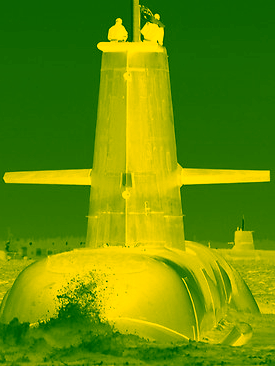Sub deal sought to ballast local builders
 Submarine manufacturers, engineering firms, experts and the opposition all want to know if a fleet of new subs will be built in Australia, and are demanding a clear statement from the Federal Government.
Submarine manufacturers, engineering firms, experts and the opposition all want to know if a fleet of new subs will be built in Australia, and are demanding a clear statement from the Federal Government.
Prime Minister Tony Abbott and Industry Minister Ian MacFarlane have sparked speculation that an order for 12 new submarines to replace the Navy’s Collins class vessels will be given to Japan. The South Australian Government says it expected the roughly $40 billion spend to flow primarily to ASC (formerly the Australian Submarine Corporation) in Adelaide.
But the contract has been up in the air since the 2007 announcement of the Collins-class submarine replacement project, in which a military-off-the-shelf (MOTS) design was always considered a high likelihood.
The Prime Minister has followed the path laid by his Labor predecessors, saying value for taxpayers outweighs local job-creation consideration.
“We should make decisions here based on defence requirements, not on the basis of industry policy, on the basis of regional policy,” Mr Abbott said this week.
He will be backed up by Industry Minister Ian Macfarlane today, who is expected to say that Australia must take a “hard look” at itself and be willing to move away from traditional manufacturing.
Macfarlane says Australia cannot compete with international manufacturing rivals, especially in a more competitive and less subsidised future.
An off-the-shelf Japanese fleet would come at about half the cost as building the subs at ASC navy manufacturing in Adelaide.
“Australia has two choices,” Macfarlane will tell the Sydney Institute this afternoon.
“We can continue to meander along with a business-as-usual approach, condemning ourselves to mediocrity and a decreasing share of global markets as we become increasingly less competitive in traditional manufacturing sectors where we are outpriced by our competitors with lower wages and lower standards of living... [or] move decisively to focus on the industries of the future.”
The Australian Industry Group says that looking overseas for a better deal raises “significant issues for the government-owned ASC, the SA economy and for the many small businesses across the country which are potential suppliers to domestically-built naval vessels’’.
Ai Group chief executive Innes Willox says many SA businesses are making preparations based on the promises by the Federal Government that submarines would be built in Adelaide.
He said Australian businesses did not want the Government procurement “to provide a blank cheque”, but that all such decisions “should take full account of through-life costs and the advantages offered by domestically based service and parts suppliers”.
“Contrasting make-or-buy [is] overly simplistic,” he said.
“Even when major defence equipment is purchased from abroad, careful planning with domestic industry is needed to ensure that the capabilities required for adaptation, fit-out, maintenance and repair are adequately developed and nurtured.”
There has been speculation that an announcement would be made at the G20 leaders’ talks in November, saying that the subs will be shared effort between Australia and Japan.
There has been some clear lead-up to a significant Japanese role in Australia’s next set of subs.
News Corp has reported that Australia’s defence purchasing guru and head of the Defence Materiel Organisation Warren King made a top-secret mission to Japan in February to start negotiations with Japan’s defence agency about its Soryu Class submarines.
Defence Minister David Johnston has discussed submarines with Japanese officials, and senior navy officers have been given tours of Japanese vessels to look at technologies including the Swedish-designed air independent propulsion (AIP) system.
The AIP system allows vessels to operate underwater without the need to surface or use a snorkel for air.
But Fairfax claims that Defence itself has been cut out of the deal, and that it is being entirely managed out of the Prime Minister’s Office.
If true, it would effectively override the consideration of all other contenders, including European firms which could have bid for the project such as Germany’s TKMS, the French DCNS or Swedish company Saab.
South Australian Premier Jay Weatherill is reportedly ropable, as are many other SA ministers, over what they consider a broken promise.
Premier Weatherill says it could be just the start of $250 billion in shipbuilding jobs and contracts moving overseas.








 Print
Print